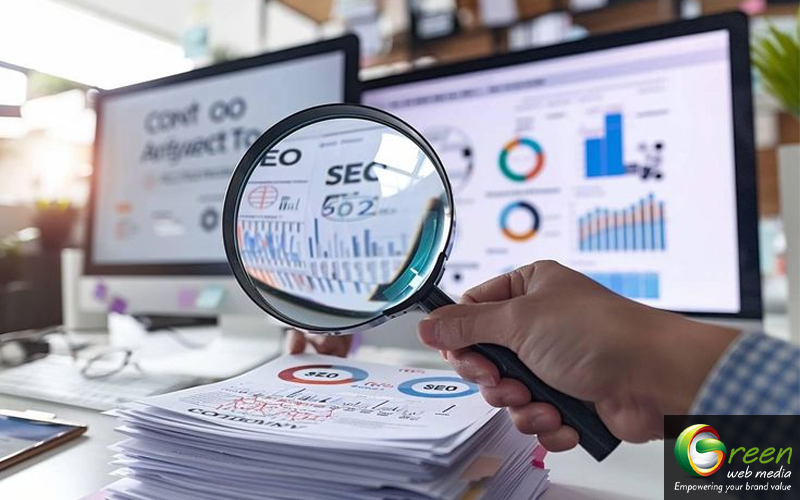The Role of Artificial Intelligence in SEO Advanced Strategies

The practice of search engine optimization (SEO) has become a crucial component of digital marketing strategies for businesses of all sizes. The goal of SEO is to improve the visibility and ranking of a website in search engine results pages (SERPs) through the deployment of a variety of tactics, including keyword optimization, content creation, link building, and more. However, with the ever-increasing competition and complexity of search algorithms, it can be challenging to stay ahead of the competitors in the game.
Artificial intelligence (AI) is a technology transforming many industries, and search engine optimization (SEO) is no exception. AI can help businesses improve their SEO strategies by providing valuable insights into user behavior, optimizing content for search engines, and automating various tasks.
In this in-depth blog, we will explore the role of AI in advanced SEO strategies and how businesses can benefit from the combination of these two technologies.
The Role of Artificial Intelligence in Search Engine Optimization (SEO)
A. Understanding search algorithms and how AI helps improve them
Search algorithms are constantly evolving to provide users with the most relevant and helpful search results. AI plays a critical role in this process by analyzing user behavior and search patterns to identify which pages are most likely to meet their needs. AI can also help search engines understand the context and intent behind search queries, making it easier to provide accurate and personalized results.
B. The role of artificial intelligence in content creation
As we all know, content is king in the world of search engine optimization (SEO), and AI can help businesses create high-quality content that is optimized for search engines. AI tools can analyze existing content on a website and provide recommendations for improvements, such as adding or removing keywords, optimizing meta descriptions, and improving readability. Moreover, AI can also generate content based on user input, such as product descriptions or blog posts.
C. The role of artificial intelligence in keyword research
Keyword research is a crucial part of any SEO strategy, as it helps businesses understand which keywords are most relevant to their target audience. AI tools can help automate this process by analyzing search trends, identifying related keywords, and providing recommendations for optimizing content. AI can also help businesses identify long-tail keywords that may be less competitive but still relevant to their target audience.
D. The role of artificial intelligence in link building
Link building is the process of acquiring backlinks to a website from other authoritative sites. AI can help businesses identify opportunities for link building by analyzing the competitors’ backlink profiles and identifying relevant websites and influencers to target. AI can also help automate the outreach process by sending personalized emails to potential link partners.
The Benefits of Using Artificial Intelligence in Search Engine Optimization (SEO)

A. Improved accuracy and efficiency
Foremostly, AI-powered SEO tools have the potential to analyze vast amounts of data in real time, providing businesses with valuable insights into user behavior and search patterns. As a result, this can help companies to make more informed decisions about their SEO strategies, resulting in improved accuracy and efficiency.
B. Personalization of search results
Secondly, artificial intelligence can help search engines provide more personalized search results based on factors such as user location, search history, and preferences. This can help businesses reach their target audience more effectively and improve their overall user experience.
C. Increased relevance of search results
Thirdly, by analyzing user behavior and search patterns, artificial intelligence can help search engines provide more relevant search results. This can help businesses improve their visibility and ranking in search engine result pages, resulting in more traffic and conversions.
D. Better analysis of user behavior
Finally, AI-powered SEO tools can provide businesses with valuable insights into user behavior, such as which pages are most popular, which keywords are driving the most traffic, and which content is most engaging. With the help of this information, businesses can optimize their SEO strategies and improve their overall user experience.

Examples of AI-powered Search Engine Optimization (SEO) Tools
AI-powered SEO tools can provide businesses with valuable insights and help automate various SEO tasks. Here are five examples of AI-powered SEO tools:
A. Google’s RankBrain
RankBrain is an AI-powered algorithm that Google uses to help interpret search queries and provide more relevant search results. RankBrain uses machine learning to identify patterns and similarities between search queries and web content, helping Google better understand user intent and provide more accurate search results.
B. MarketMuse
MarketMuse is an AI-powered content optimization platform that helps businesses improve their content strategy. MarketMuse uses natural language processing and machine learning to analyze existing content and identify gaps in a business’s content strategy. It then provides recommendations for creating new content optimized for search engines and meets the target audience’s needs.
C. BrightEdge
BrightEdge is an AI-powered platform that helps businesses improve their search rankings and optimize their content. BrightEdge uses machine learning to analyze search engine results pages and identify opportunities for businesses to improve their rankings. It also provides insights into user behavior and helps companies to optimize their content for specific search queries.
D. Acrolinx
Acrolinx is an AI-powered content optimization platform that helps businesses improve the quality and consistency of their content. Acrolinx uses natural language processing to analyze content and provide recommendations for improving readability, tone, and consistency. It also helps businesses optimize their content for search engines and ensures that their content is aligned with their brand voice and messaging.
E. Botify
Botify is an AI-powered platform that helps businesses improve their search rankings and optimize their content. Botify uses machine learning to analyze website data and identify technical SEO issues that may be affecting search rankings. It also provides insights into user behavior and helps businesses optimize their content for specific search queries.
These are just a few examples of the many AI-powered SEO tools available to businesses today. By leveraging these tools, companies can gain valuable insights and automate various SEO tasks, ultimately improving their search rankings and overall online visibility.
The Best practices for Combining Artificial intelligence and Search Engine Optimization (SEO)
While AI can be a powerful tool for improving SEO strategies, it is essential to approach it with caution. Here are some of the best practices for combining Artificial intelligence (AI) and search engine optimization (SEO):
A. Emphasizing human oversight
AI-powered tools can provide valuable insights but are not a substitute for human judgment. Thus, it is crucial to have human oversight to ensure that the insights provided by AI are accurate and aligned with the goals of the business.
B. Prioritizing user experience
While artificial intelligence can help businesses improve their search rankings, it is essential not to sacrifice user experience in the process. Therefore, companies should prioritize creating high-quality, engaging content that meets the needs and provides value to their audiences.
C. Continuously monitoring and adjusting strategies
Artificial intelligence is constantly evolving, and businesses need to stay up-to-date with the latest developments to ensure that the implementation of their SEO strategies is effective. As a result, it is essential to continuously monitor and adjust strategies based on user behavior and search trends.

The Future of Artificial Intelligence in Search Engine Optimization (SEO)
In this technologically driven world, artificial intelligence is rapidly transforming the world of search engine optimization, and the future looks promising. Here are some potential advancements in AI technology that could drastically impact the world of search engine optimization (SEO):
A. Advancements in AI technology and their potential impact on SEO
As AI technology continues to improve, it is likely that search engines will become even more personalized and accurate. Artificial intelligence could also help businesses optimize their content for voice search and other emerging search technologies.
B. Opportunities for AI to improve other areas of digital marketing
Artificial intelligence has the potential to transform other areas of digital marketing, such as social media marketing and email marketing. AI-powered tools can help businesses analyze user behavior and provide personalized recommendations for improving engagement and conversions.
C. Importance of staying up-to-date with AI advancements in SEO
As AI technology continues to evolve, it is essential for businesses to stay up-to-date with the latest developments to remain competitive. Furthermore, investing in AI-powered search engine optimization tools and staying informed about emerging trends and best practices can help businesses stay ahead of their competitors in the game.
In a nutshell
In conclusion, artificial intelligence is a powerful tool for businesses looking to improve their search engine optimization strategies. By leveraging AI-powered tools to analyze user behavior, optimize content, and automate various tasks, companies can improve their search rankings, reach their target audience more effectively, and improve their overall user experience.
However, it is essential to approach AI with caution and prioritize human oversight and user experience. As AI technology continues to evolve, businesses that stay up-to-date with the latest developments will be best positioned to succeed in the competitive world of search engine optimization (SEO).






